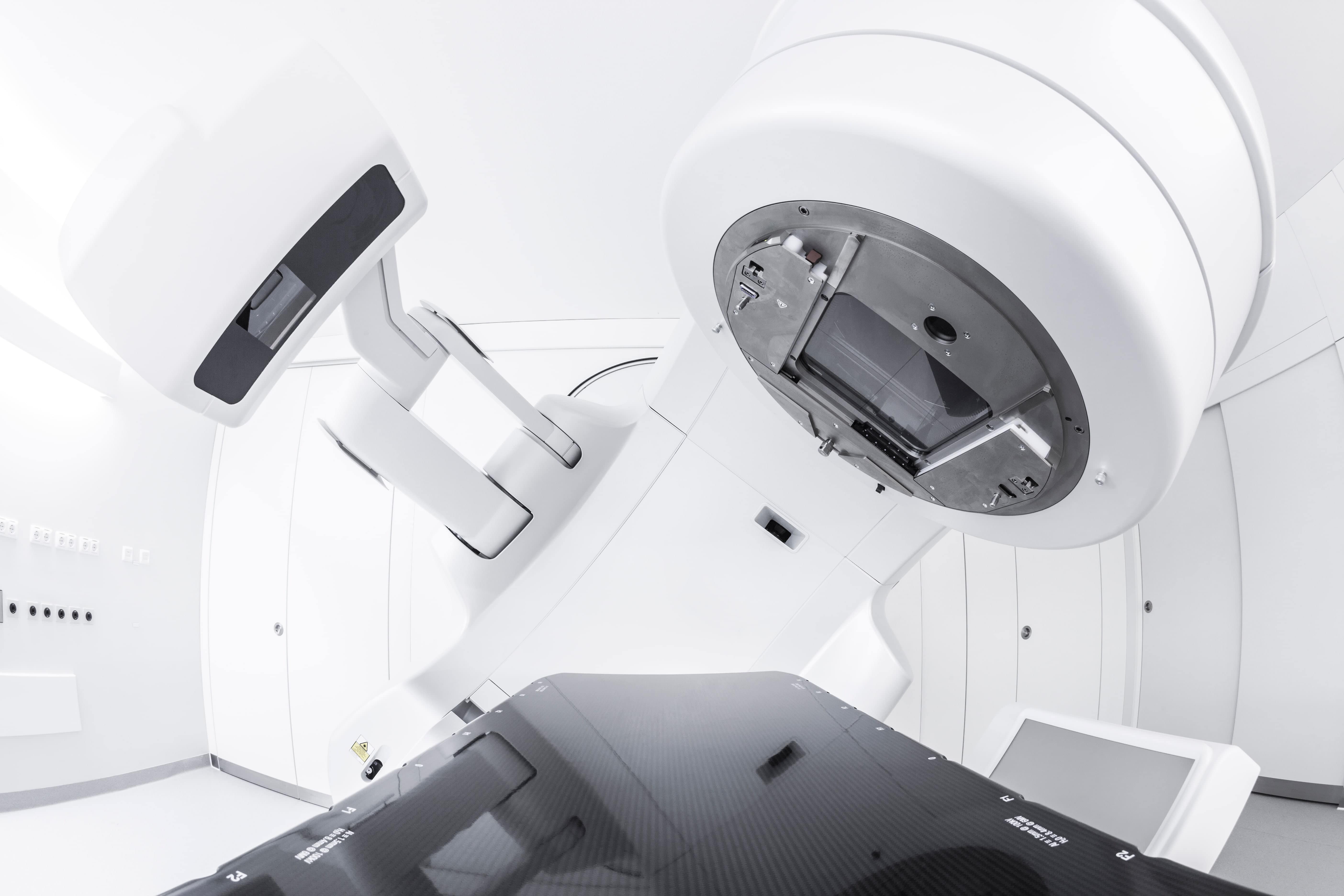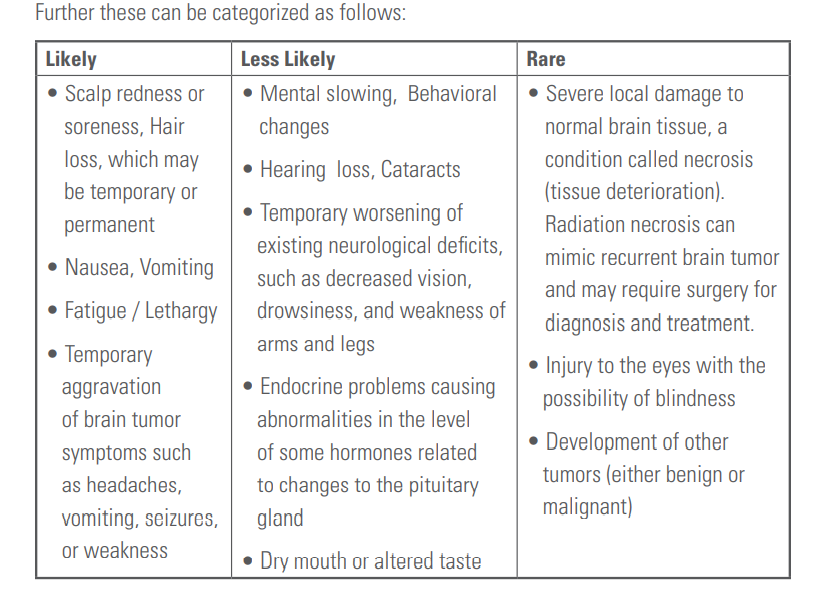Radiation Therapy for Brain Tumor

Brain Tumor
Brain tumors are abnormal growths in the brain that can be either cancerous (malignant) of noncancerous (benign). The effects on the brain of malignant and benign brain tumors are very similar and can cause the same types of problems depending upon the type of tumor and where it is located in the brain.
Radiation Therapy
Radiation therapy also called radiotherapy is a type of cancer treatment that uses beams of intense energy to kill cancer cells. Radiotherapy may be used alone or in combination with surgery or chemotherapy. It has many uses in cancers:
- After surgery to eliminate any cancer cells that remain in the treated area.
- Before surgery to shrink the tumor and make it operable.
- As primary treatment.
- To treat cancer that has spread to the other areas of the body.
Possible side effects of Radiation Therapy
Radiation uses high-energy rays to kill cancer cells & affects cells only in the part of the body that is to be treated. While radiation is not painful to receive on its exposure, it can cause side effects that are temporary and reversible.
The side effects depend mainly on:
- Type of radiation therapy
- The dose of radiation
- The part of your body that is treated
Two people having the same treatment may react differently. The type and severity of your side effects have nothing to do with the success of your treatment.
What to ask in case of any discomfort
During treatment, tell your radiation oncologist, radiation therapist or nurse if you have any side effects. There are ways to reduce any discomfort you experience. Talk to your radiation oncologist first if you plan to use any medicines, creams, home remedies or alternative or complementary medicines to ease side effects.
General side effects
Acute side effects:
Generally appear during the course of radiotherapy treatment and ease off or gradually disappear within 6-12 weeks.
Delayed or late side effects:
Appear in months, generally 6 to 18 months or later, post radiotherapy, however are minimized with radiology based planning and delivery techniques.

Patient care during Radiotherapy
The effects on the hair start about two weeks after you begin radiation therapy.
- Hair loss is usually over the area being treated & usually falls out in clumps - It is usually temporary.
- The hair will begin to grow back within 3-6 months following therapy, but the new growth might not be the same texture or color as your original hair.
- Permanent hair loss over the area being treated can occur in some patients.
Management of hair loss
- To minimize hair loss, hair can be cut short.
- Use an infant comb and brush set when hair begins to grow back - Use a mild shampoo.
- Do not use products such as hot rollers, curling irons, hair sprays or dyes - Consider purchasing a wig, or buy some scarves, turbans or caps.
Skin irritation
During radiation, the skin in the area being treated can become reddened, flaky and itchy. Notify the physician if there is irritation.
Skin irritation management
- Do not apply anything (Lotions/oils etc.) on your scalp unless the doctor prescribes it.
- Do not use hot water bottles, icepacks or heating pads.
- Do not use tape, gauze or bandages unless recommended by the care team.
- Do not use gel soaps, soap solutions, Dettol, spirit, antiperspirants, and deodorants.
- Take bath with soap and water (cold or warm).
Nausea & vomiting
Nausea sometimes accompanies radiation therapy or with the combination of radiation and chemotherapy.
Nausea & vomiting management
If nausea and/or vomiting after a treatment session is experienced, the doctor might prescribe a medication called an antiemetic. These are generally very effective at minimizing or controlling nausea. In addition to the medication prescribed keep the following points in mind:
- Relax, as anxiety can worsen nausea.
- Avoid eating for a 1-2 hours before the treatment.
- Stay away from full of fat or spicy & strong smelling dishes - Drink plenty of water (including lemonades and ORS etc.)
- Plan to eat your meals when the nausea is the least troublesome
Changes in appetite
The appetite may decrease during the course of the treatment, followed by some weight loss (in some patients).
Changes in appetite management
- Start with small & frequent meals.
- Eat when hungry rather than eating at the set mealtimes.
- Eat what is appetizing and do not force food.
- Have snacks handy to nibble on, during the day.
- Liquids may seem to be more tempting than solids.
- Choose low calorie or low fat diet as weight gain due to steroids is inevitable.
If there is weight loss, try adding nutritional supplements. Our dieticians are available to help in nutrition maintenance.
Drowsiness and fatigue
Most people experience some degree of fatigue and drowsiness during radiation therapy. However, family needs to be alerted if drowsiness is of sudden onset or is accompanied by confusion & consult the doctor immediately.
Drowsiness and fatigue management
- Avoid rushing and limit activities.
- Use assistive devices, such as grab rails in the bathroom, a raised toilet seat. Use a shower chair to bathe. Sit down to dry off. Avoid bending and leaning over as much as possible.
- Wear comfortable clothes and low-heeled shoes.
- Sit down whenever possible. Delegate housework as much as possible.
Child care is a difficult issue, because young children may not understand the inability of an adult to be the care giver. Children need to be taken into confidence and given a beautiful picture. Teach your children to climb onto your lap, rather than expecting you to lift them. Have someone help with activities involving lifting.
Sleep and rest
Rest & sleep are the vital key to faster recovery.
Night time tips
- Reduce the surrounding sounds.
- Develop a sleep routine, let friends/family know your routine.
- Avoid taking caffeine in the latter part of the day, also, avoid chocolate.
Napping and resting tips
- Take short naps during the day, but make sure they aren’t too long or late in the day as that can disturb night sleep.
- Allow some quiet time each day as time off helps you gain energy exercise.
- Ask the physical therapist to help with regard to physiotherapy and exercises.
Neurologic (brain-related) effects
These reactions are caused by radiation- induced brain swelling (edema). Symptoms can mimic the symptoms of brain tumor, like speech problems or muscle weakness or those of increased intracranial pressure, such as headache, nausea, or double vision.
Management of the effects
These reactions are temporary and are usually relieved by anti-edema medications such as dexamethasone (corticosteroids), mannitol, diamox, glycerol etc. Often, steroids are prescribed to be taken during the entire treatment so that these side-effects are avoided or minimized. The steroid dose is gradually reduced and discontinued when treatment is completed.
Seizures (Fits)
A seizure is an outward sign of abnormal electrical activity in the brain. In brief, seizures may cause unusual movements in parts of the body; a change in awareness; and/or unusual sounds, visions, or sensations. Between 25-40% of people diagnosed with a brain tumor have a seizure at some time during their illness. Most seizures occur randomly, at any time, and without any particular cause.
If there are recurrent seizures, some events may trigger them and patient may experience this before actual seizure. Bright lights, flashing lights, specific odors, lack of sleep, missed meals, menses, increased stress, alcohol, can all be triggers.
Management of Seizures (Fits)
- Make sure the person can breathe, in case not, loosen up the clothes around the neck - Do not panic, your role is to protect the person having the seizure.
- Do not try to stop the seizure.
- Clear the area of sharp objects; if possible, help the person lie on their side to keep the airway open.
- Protect the person’s head from being bumped, but do not restrain their arms or legs during a seizure.
- Do not put anything in the person’s mouth, including your fingers as anything placed in the mouth will block the airway and cause breathing problems.
- Immediately contact a doctor.
Guidelines to be followed while & after treatment
Weekly check up
During the course of radiation treatments consult your radiation oncologist for your weekly check-up. This will help you talk out the problems you are facing and take medication or steps to help you go through the treatment.
Routine activities
You are encouraged to take up your routine activities during the course of radiation as they will help you get through the day and add meaning to the day. Over exertion, crowded places, family members with acute infections are avoidable. Swimming, driving and being alone in the locked rooms is not recommended for a patient with brain tumor.
Missing treatment
It is recommended that there should be no breaks in the treatment. A patient may need extra care and /or hospitalizations to overcome the side effects, but try not to miss the treatment without discussing with the doctor.
After the treatment
After the treatment is over, it may take 3–6 weeks to recover completely from the adverse effects. At the time of discharge, the patient will be given medications and instructions to aid in the recovery process. If necessary or if symptoms worsen, the patient may schedule an appointment with a doctor.






